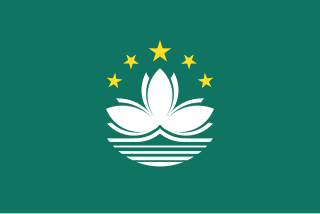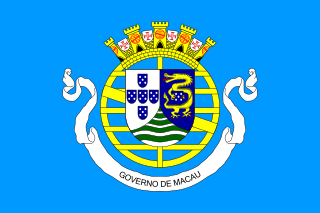| |||||
| Decades: | |||||
|---|---|---|---|---|---|
| See also: | Other events of 1691 History of China • Timeline • Years | ||||
Events from the year 1691 in China .
| |||||
| Decades: | |||||
|---|---|---|---|---|---|
| See also: | Other events of 1691 History of China • Timeline • Years | ||||
Events from the year 1691 in China .

Macau, also spelled Macao and officially the Macao Special Administrative Region of the People's Republic of China, is a city and special administrative region of the People's Republic of China in the western Pearl River Delta by the South China Sea. With a population of about 680,000 and an area of 32.9 km2 (12.7 sq mi), it is the most densely populated region in the world.

Macau is a Special Administrative Region (SAR) of the People's Republic of China. In 1557 it was leased to Portugal as a trading post in exchange for an annual rent of 500 tael in order to stay in Macau, it remained under Chinese sovereignty and authority until 1887, the Portuguese came to consider and administer it as a de facto colony. Following the signing of the Treaty of Nanking between China and Britain in 1842, and the signing of treaties between China and foreign powers during the 1860s, establishing the benefit of "the most favoured nation" for them, the Portuguese attempted to conclude a similar treaty in 1862, but the Chinese refused, owing to a misunderstanding over the sovereignty of Macau. In 1887 the Portuguese finally managed to secure an agreement from China that Macao was Portuguese territory. In 1999 it was handed over to China. Macau was the last extant European territory in continental Asia.
Politics of Macau is a framework of a politically constrained multi-party presidential system, dominated by the People's Republic of China. It includes the legislature, the judiciary, the government, and a multi-party system. Executive power is exercised by the government, led by the Chief Executive.
"One country, two systems" is a constitutional principle of the People's Republic of China describing the governance of Hong Kong and Macau since they became Special Administrative Regions (SARs) of China in 1997 and 1999 respectively.

The National Day of the Republic of China, also referred to as Double Ten Day or Double Tenth Day, is a public holiday that is now held annually in the Taiwan Area of the Republic of China (ROC). It was also officially celebrated in mainland China until 1949. It commemorates the start of the Wuchang Uprising on 10 October 1911 which ultimately led to the collapse of the imperial Qing dynasty and establishment of the Republic of China on 1 January 1912.

The First Opium War, also known as the Opium War or the Anglo-Chinese War, was a series of military engagements fought between Britain and the Qing dynasty of China. The immediate issue was Chinese official seizure of opium stocks at Canton to stop the banned opium trade, and threatening the death penalty for future offenders. The British government insisted on the principles of free trade, equal diplomatic recognition among nations, and backed the merchants' demands. The British navy defeated the Chinese using technologically superior ships and weapons, and the British then imposed a treaty that granted territory to Britain and opened trade with China.
The Macau Security Force is Macau's public security body under the Secretariat for Security, responsible for handling government activities ranging from law enforcement to public safety.

Law enforcement in China consists of an extensive public security system and a variety of enforcement procedures used to maintain order in the country. Along with the courts and procuratorates, the country's judicial and public security agencies include the Ministry of Public Security and the Ministry of State Security, with their descending hierarchy of departments, bureaus(局), subbureaus(副局), and stations (所).

Macau was under Portuguese rule until 1999. During the final period of colonial administration prior to the handover to China, Portugal retained only limited numbers of military personnel in Macau for liaison and support purposes; the last major units having been withdrawn following the Carnation Revolution of 1974. The Macao Garrison of the People's Liberation Army was established in 1999.

Chinese nationality law details the conditions in which a person holds People's Republic of China (PRC) nationality. Foreign nationals may naturalize if they are permanent residents in any part of China or they have immediate family members who are Chinese citizens. Residents of the Taiwan Area are also considered Chinese citizens, due to the PRC's extant claim over areas controlled by the Republic of China (ROC).

The History of Hong Kong under Imperial China began in 214 BC during the Qin dynasty. The territory remained largely unoccupied until the later years of the Qing dynasty when Imperial China ceded the region to Great Britain under the 1842 Treaty of Nanking, whereupon Hong Kong became a British Colony.
The Secretariat for Security is the government department responsible for public safety and security in Macau. The role replaced the former post of Secretary for Public Security. It is responsible for managing the Macau public security and police agencies.
The Government of the Macau Special Administrative Region of the People's Republic of China, are headed by secretariats or commissioners and report directly to the chief executive. The affairs of the government are decided by secretaries, who are appointed by the chief executive and endorsed by the State Council of the Central People's Government in Beijing. As a special administrative region of China, Macau has a high degree of autonomy, in light of the "One Country, Two Systems" policy. The Macau Government, financially independent from the Central People's Government, oversees the affairs of Macau.

The transfer of sovereignty of Macau from Portugal to the People's Republic of China (PRC) occurred on 20 December 1999.

The Government of the Macau Special Administrative Region allows citizens of specific countries/territories to travel to Macau for tourism or business purposes for periods ranging from 14 to 180 days without having to obtain a visa. For other entry purposes, such as establishing residence on a long-term basis, a different policy applies.

Hongyipao was the Chinese name for European-style muzzle-loading culverins introduced to China and Korea from the Portuguese colony of Macau and by the Hendrick Hamel expedition to Joseon in the early 17th century.

The Public Security Police Force is the non-criminal police department of Macau and a branch of the Macau Security Force. Originally known at first as the Macau Police, the force went through several name changes before taking on its current name. The PSP celebrates its foundation on 14 March 1691.

Capital punishment in Macau was formally abolished in 1976 and reiterated in the Penal Code of Macau in the 1995.

Portuguese Macao covers Macau's history from the establishment of a Portuguese settlement in 1557 to the end of Portuguese colonial rule and transfer of full sovereignty to the People's Republic of China in 1999. Macau was both the first and last European holding in China.
The Public Security Police Force Band is a police band of the Public Security Police Force of Macau used for public ceremonies in the Macao Special Administrative Region of the People's Republic of China. It's composed of 44 police officers and supports all community events.